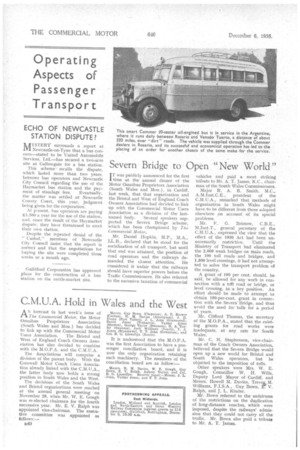Severn Bridge to Open 'New World"
Page 54

If you've noticed an error in this article please click here to report it so we can fix it.
I T was publicly announced for the first time at the annual dinner of the Motor Omnibus Proprietors Association (South Wales and Mon.), in Cardiff, last week, that that organization and the Bristol and West of England Coach Owners Association had decided to link up with the Commercial Motor Users Association as a division of the last named body. Several speakers supported the Severn Bridge scheme, which has been championed by The COMMenial Motor.
Mr. Daniel Hopkin, M.P., M.A., LL.B., declared that he stood for the socialization of all transport, but until that end was attained, the position of road operators and the railways demanded the closest attention. He considered it unfair that the railways should have superior powers before the Traffic Commissioners. He also referred to the excessive taxation of commercial vehicles and paid a most striking tribute to Mr. A. T. James, K.C., chairman of the South Wales Commissioners.
Major R. A. B. Smith, M.G., A.M.Inst.C.E., president of the C.M.U.A., remarked that methods of organization in South Wales might have to be different from those adopted elsewhere ,on account of its special problems.
Mr. F. G. Bristow, C.B.E., M.Inst.T., general „secretary of the C.M.U.A., expressed the view that the effect of the 1930 Act had been unnecessarily restrictive, Until the Ministry of Transport had eliminated the 2,000 weak bridges on main roads, the 100 toll roads and bridges, and 1,500 level crossings, it had not attempted to solve the transport problem of the country.
A grant of 100 per cent, should, lie said, he allowed for any work in connection with a ton road or bridge, or level crossing, in a key position. An effort should be made to attempt to obtain 100-per-cent. grant in connection with the Severn Bridge, and thus avoid the need for tolls for a period of years.
Mr. Clifford Thomas, the secretary of the M.O.P.A., stated that the existing grants for road works were inadequate, at any rate for South Wales. • Mr. C. H. Stephenson, vice-chairman of the Coach Owners Association, believed that the Severn Bridge would open up a new world for Bristol and South Wales operators, but he objected to the imposition of tolls.
Other speakers were Mrs. W. E. Gough, Councillor W. H. Wills, Deputy Lord Mayor of Cardiff, and Messrs. Howell M. Davies, Trevoz,.M. Williams, F.I.S.A., Guy Bown, E: V. Ralph, and J. L. Kinder.
Mr. Boxirn referred to the unfairness of the restrictions on the duplication of long-distance coaches, which were imposed, despite the railways' admission that they could not carry all the traffic. Mr. Bown also paid a tribute to Mr. A. T. lames.




























































































